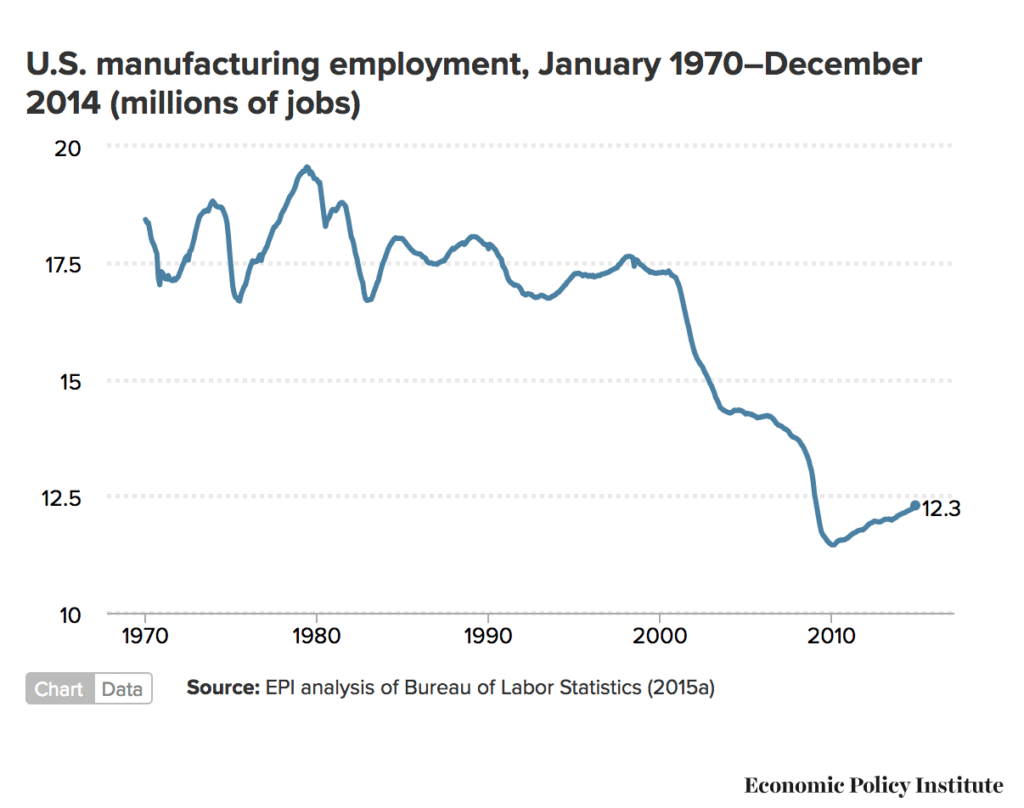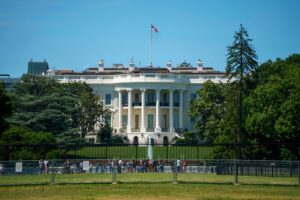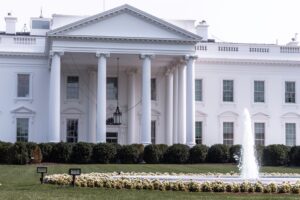Image Source: Economic Policy Institute, Bureau of Labor Statistics
There’s a passage in Adam Smith’s classic text of early capitalism, The Wealth of Nations, in which he discusses the rationale behind free trade between countries. He compares the family of nations to an actual family:
“It is the maxim of every prudent master of a family never to attempt to make at home what it will cost him more to make than to buy. The tailor does not attempt to make his own shoes, but buys them from the shoemaker. The shoemaker does not make his own clothes, but employs a tailor….What is prudence in the conduct of every private family can scarce be folly in that of a great kingdom.”
This simple metaphor forms the basis of all modern theories of free trade. For its defenders, international free trade is a win-win, increasing the wealth and general affluence of all participants. Why make cars in the US if they can be made more cheaply in Mexico? Why make air conditioners in the US if they can be produced more cheaply in China? By encouraging each nation to produce whatever it makes best and most competitively, trade brings down prices to the everyone’s general benefit.
But what would Smith say if in his example the metaphorical family could not produce anything better or more cheaply than other families? What if there were no meaningful work left for the family to do, and if they could only earn enough to pay for their shoes and clothes by becoming servants for the shoemaker and tailor? What if the only work available to them was digging ditches? What if the tailor and shoemaker were their enemies and would gladly withhold their goods to harm this hypothetical family? How would Adam Smith assess these circumstances?
We don’t know. Smith’s classic argument for free trade includes a central, unexamined assumption: that there will always be plenty of meaningful and dignified work to go around. But this is the central flaw in Smith’s reasoning, and it remains the central flaw of the modern defenders of international free trade.
The globalization revolution of the past 30 years has indeed made everything cheaper—both in price and often, unfortunately, in quality. But it has also left the United States at a great economic disadvantage, because the American industrial jobs which, as a result of free trade processes, were offshored to Asian factories, were either not replaced or were replaced with non-industrial jobs of lower pay and quality.
Our historically low unemployment rate, currently under 4%, is misleading. This number ignores job quality, and counts a minimum-wage fast food job as of the same value as a higher-wage manufacturing job. The unemployment rate also ignores the significant number of Americans who have given up looking for work, including a sizable group who have ended up on long-term disability out of physical or mental exhaustion and now use disability as long-term unemployment insurance. Telling people that we’re in the best economy of our lifetime is a cruel joke to millions of Americans. Despite the rosy headlines, for many Americans it has never been harder to get by—the economy is not working for them.
This economic reality, ignored by most of America’s governing elite until the 2016 election, explains Donald Trump’s core appeal—a promise to stem the tide and bring back manufacturing jobs. For those in former industrial areas who felt left behind and forgotten, it was worth overlooking Trump’s many shortcomings and stains to elect the first President in our times who really seemed to understand their plight. Many voters held their noses and voted for him, because alone among Democratic and Republican candidates, Trump was raising the issues that most affected them.
I’m not sure that Trump’s policy proposals are the right ones. But even if he proposes the wrong solutions, he has been asking the right questions.
One of the right questions is whether the global free market benefits the majority of Americans. It certainly benefits the affluent, who benefit from cheaper goods, and often make tremendous amounts of money directly and indirectly from international trade. But it’s hard to disagree with President Trump that trade does not benefit large groups of our fellow Americans. Manufacturing jobs have been declining for some time, not only due to international trade—technology is equally or even more to blame—but international trade has contributed. When jobs like these are lost, someone always promises that there will be “retraining” and that new, information-age jobs will appear to employ the now-unemployed. But I think nearly all of us can perceive that the commonly-available jobs of the new information-focused economy (Amazon warehouse “picker”, call-center operator, Walmart shelf stocker) do not provide the same quality, dignity, or stability of the industrial jobs they replaced.
The solution to this problem must be complex and multifaceted. Trump’s claims that he would bring back manufacturing and coal jobs were extremely simplistic, and have not materialized. But I would argue that one aspect of the solution is indeed tariffs, such as those President Trump has imposed on China. It is generally acknowledged that China doesn’t adhere to all the rules of the global trade system in its economic policies. China manipulates its currency to make Chinese goods cheaper in the U.S. and U.S. goods more expensive in China. China steals U.S. intellectual property routinely. There is pretty wide bipartisan consensus on these facts, although not on the proper response to them.
Critics of tariffs point out that they can lead to trade wars, in which both hostile countries continuously ratchet up punitive tariffs on each other. Because one result of this is price increases for consumers across the board, many oppose tariffs on consumer-protection grounds.
But this sacred cow of modern political economy ought to be questioned. A rising stock market and low consumer goods prices are not the only values we ought to hold dear as a people. The cost of a product alone, indifferent to its value in context, is not a consideration worthy of a free people. Slavery, after all, would certainly produce lower prices. We don’t support slavery to keep prices low because slavery is against our values. We need to ask—what other values are worth paying more for?
It seems to me that dignified, lucrative, and stable jobs for more Americans would be well-worth paying more for consumer goods. The ultimate legacy of President Donald Trump and the 2016 election will be, I dearly hope, a national discussion of these issues and solutions.
We have not yet found new jobs sufficient to take the place of the industrial jobs lost in recent decades. Businesses find it cheaper to manufacture goods overseas because wages in developing countries are lower. Given that Americans can’t control Asian labor policy, it seems to me domestic American manufacturing can be made competitive again only by imposing tariffs on imported goods. Otherwise, it’s not a level playing field and the free market can’t function properly.
Even Adam Smith recognized that national defense should not be subject to free trade’s caprices. If our ability to defend ourselves is dependent on resources supplied by another potentially hostile nation, we have a weakness that can be exploited. This applies, as well, to dependence on foreign imports of food or oil, things that keep people alive and move the economy.
But I would argue that the loss of meaningful, stable, and dignified work for Americans, and the cultural decay resulting from it, are as dangerous to America as anything a foreign adversary could do to us directly. We need to remember that the loss of good jobs not only affects people financially. It also creates the conditions of hopelessness and despair which lead to drug abuse, the breakup of families, and other aspects of cultural decay. If our current dearth of meaningful, stable, and dignified work were imposed on us by a foreign adversary, we might rightfully consider it an intolerable act of war.
I’m not sure that Trump’s trade war with China will be effective. I am not enough of a student of economics to have an informed opinion about this particular application of tariffs. But it seems to me that tariffs are an important part of any nation’s economic policy, and we ought to use them more strategically, as countercultural as that view currently is. In some ways this is a complete change in how we think about our national economy. Such a change would not merely require applying tariffs here and there—which might cause more harm than good—but using them strategically as a fundamental tool to protect American jobs and industries.
Buying American made goods will cost more. But we have an obligation to all our fellow Americans that our economic policies provide good jobs to Americans of all walks of life, and not just particular segments of society. Many of my fellow Americans are hurting and need help. It seems like the least I can do is be willing to pay a little more if it creates more meaningful, stable, and dignified work.




